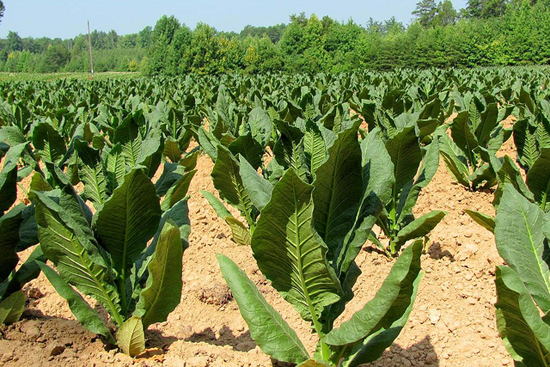Fighting H1N1 with Tobacco Plants
Project earns Joseph von Fraunhofer Prize for ENG's Sharon

After decades of demonization as a health menace, the tobacco plant is about to become a source of potentially lifesaving medicines, thanks in part to the work of Andre Sharon, who leads a team that built a fully automated factory that uses synthetically altered tobacco plants to grow vaccines for some of the world’s most deadly viruses, including H1N1, yellow fever, and malaria, as well as for emerging biological threats.
Those efforts have earned Sharon, a College of Engineering professor of mechanical engineering and the director of the Fraunhofer USA Center for Manufacturing Innovation (CMI), based at Boston University, the 2013 Joseph von Fraunhofer Prize. The prize was presented yesterday in Hannover, Germany, at a gala attended by German Chancellor Angela Merkel.
The 50,000 euro ($66,065) prize is given annually to a staff member of Fraunhofer Gesellschaft in recognition of outstanding scientific work leading to the solution of application-oriented problems. Sharon shares the award with colleague Vidadi Yusibov, the executive director of the Delaware-based Fraunhofer USA Center for Molecular Biotechnology (CMB) and a senior research fellow at the Delaware Biotechnology Institute. Fraunhofer Gesellschaft is Europe’s largest applied research organization, with 66 branches worldwide and 8 in the United States. This is the first time in the award’s 35-year history that it has gone to an American.
“This recognition is quite meaningful, because our work is going towards solving a real need in our society—the rapid production of vaccines,” says Sharon. “It’s a very great honor and very exciting.”
The Center for Manufacturing Innovation, a collaborative center between BU and Fraunhofer Gesellschaft, was established in 1995. The center scales up promising research into real automation systems, laboratory procedures, instruments, and devices that are often deployed to the marketplace. CMI joined forces with the Center for Molecular Biotechnology in 2010 to build the plant-based factory, which is in Newark, Delaware.
Typically, flu vaccines have been produced in chicken eggs, in a process that Sharon says is expensive and perilously slow in the case of epidemics. “A good example of that was the H1N1 pandemic—the swine flu,” Sharon says. “It took way too long to come up with a vaccine in the quantities required.”

In 2009, in response to the H1N1 pandemic, which killed more than 150,000 people, the federal government began a $1.6 billion program—the most ambitious immunization campaign in US history—to find ways to quickly produce a large number of vaccines. The next year, the government’s Defense Advanced Research Projects Agency learned of the work being done by the CMI and CMB, which uses tobacco plants’ genetically engineered mechanisms to produce proteins within its leaves and stalks, and awarded the group a grant to study the rapid production of vaccines.
The collaboration now grows tens of thousands of tobacco plants in its Delaware factory, where they are tended by robots that bring the trays to and from the lighted, irrigated growth modules. After four to six weeks of growth, the robots move the plants to a machine that inserts genetic instructions to produce the appropriate protein. One or two weeks later, a harvesting machine shears the plants from their trays and uses routine chemical separation procedures to extract the protein, which is converted to a vaccine.
“This factory turned what would be an agricultural process—where you would have to seed the plants and give them the right light—into an industrial process, where you grow the plants hydroponically in trays, meaning they are not grown in soil,” Sharon says. “These plant vaccine factories can be built anywhere in the world where a large number of vaccines are needed, whether it be urban, rural, or developing areas.”
For Sharon, the Joseph von Fraunhofer Prize is confirmation of a rewarding career, one that has given him the opportunity to work in different areas. At BU, Sharon’s research interests range from biotech and biomedical instrumentation to harvesting wave energy from the ocean.
“I have the best job in the world, because not only do I get to work with really smart and energetic faculty and students, I also get to work with industry,” he says. “I have a foot in many areas because the research we do is translational, including biology and engineering, and it goes all the way to application.”
Comments & Discussion
Boston University moderates comments to facilitate an informed, substantive, civil conversation. Abusive, profane, self-promotional, misleading, incoherent or off-topic comments will be rejected. Moderators are staffed during regular business hours (EST) and can only accept comments written in English. Statistics or facts must include a citation or a link to the citation.